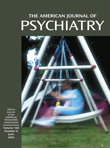Does Cognitive Recovery After Treatment of Poststroke Depression Last? A 2-Year Follow-Up of Cognitive Function Associated With Poststroke Depression
Abstract
OBJECTIVE: Cognitive impairment is common after stroke and may be caused by poststroke depression. Remission of poststroke major depression after treatment has been associated with improvement in cognitive function. The current study was designed to examine how long that cognitive improvement lasts and to compare depressed patients’ cognitive status with that of nondepressed patients with comparable lesions. METHOD: Seventeen patients with poststroke depression and cognitive impairment who had early and sustained remission of their depression during a double-blind treatment study were compared with 42 nondepressed stroke patients who remained nondepressed throughout the follow-up. Mood and cognitive function were followed-up over 2 years with the Hamilton Depression Rating Scale and Mini-Mental State Examination (MMSE). RESULTS: In the patients with early and sustained remission of depression, there was rapid improvement of cognitive function, which was maintained over 2 years. Their initial MMSE score of 23.3 (SD=4.2) improved to 26.6 (SD=3.5) at 3 months and was 26.1 (SD=3.6) at 2 years. The nondepressed patients showed essentially no change in cognitive function over 2 years (initial MMSE score: mean=26.3, SD=3.1; score at 2-year follow-up: mean=25.7, SD=4.1). CONCLUSIONS: Cognitive function, once improved after remission of poststroke depression, is likely to remain stable over the next 2 years in the absence of subsequent reinjury to the central nervous system. Cognitive impairment due to poststroke depression is reversible and can be quantified separately from cognitive impairment on the basis of the location and extent of ischemic brain damage.



